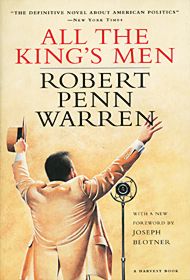 Once upon a time, about twenty-five years ago, I read a biography of Huey "Kingfish" Long, and I only remember the highlights: Huey ran Louisiana in the 1930's, was a populist to end all populists, had a proposed program called "Share the Wealth," and was assassinated by some guy who was in turn shot by Long's bodyguard(s). Robert Penn Warren's 1947 Pulitzer prize winning fictional account of the life and times of Willie Stark, popular governor of an unnamed Southern state, pretty much follows the general outline of what I remember of Long's career. However, it's been a long time, so I can't vouch for the details.
Once upon a time, about twenty-five years ago, I read a biography of Huey "Kingfish" Long, and I only remember the highlights: Huey ran Louisiana in the 1930's, was a populist to end all populists, had a proposed program called "Share the Wealth," and was assassinated by some guy who was in turn shot by Long's bodyguard(s). Robert Penn Warren's 1947 Pulitzer prize winning fictional account of the life and times of Willie Stark, popular governor of an unnamed Southern state, pretty much follows the general outline of what I remember of Long's career. However, it's been a long time, so I can't vouch for the details.The book is much more than Huey Long renamed and fictionalized, however. It's an exploration of how power corrupts, of how we're all, as Willie says, "conceived in sin and born in corruption." The novel is misnamed. It's either about Willie and one of his men, the narrator, Jack Burden. Or it's about all the King's women ---his long-suffering wife, Lucy, his mistress, Sadie, and his upper class lover, Anne. For a Southern novel it's strangely silent on the subject of race and race relations. It seems that in the Louisiana of Willie Stark, black people are to be seldom seen and definitely not heard. It's the white voters who count, and Willie has a gift for making the poor white hicks of rural Louisiana feel as if they're an important part of the power structure. He's one of them, he says, a hick, too, raised up by God to lead them on to good roads, decent sanitation, free education, and universal health care. And he'll pay for it all by taxing the rich. Gee, haven't we all heard that speech before? Maybe old Huey/Willie has been reincarnated several times since the 1930's.
Ambition, love, fear, money."
All the King's Men explores all of these motivations for sin and corruption. The novel's characters display the consequences of action and of inaction in a world in which the choices are between using evil means to create some possible (corrupt) good or remaining pure by not participating in the world, particularly the world of politics, at all. I think there is a Third Way, as Bill Clinton and Tony Blair would have said, but perhaps I am mistaken. Or perhaps in Louisiana there are only two possibilities: become corrupted by the process or stand back and let the corrupt men rule the state.
1 comment:
Great review. I need to read this for some remaining challenges, but I've been trying to put it off. You're review makes me want to read it next, which I probably will. :)
Post a Comment